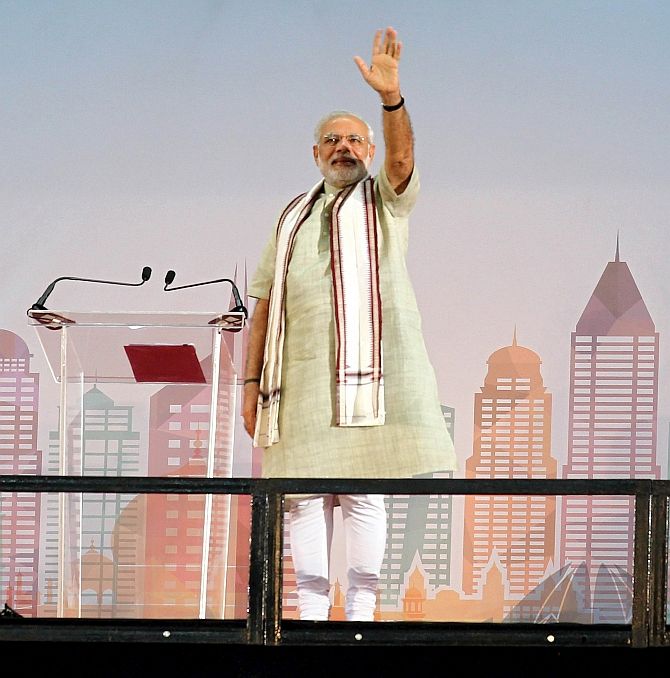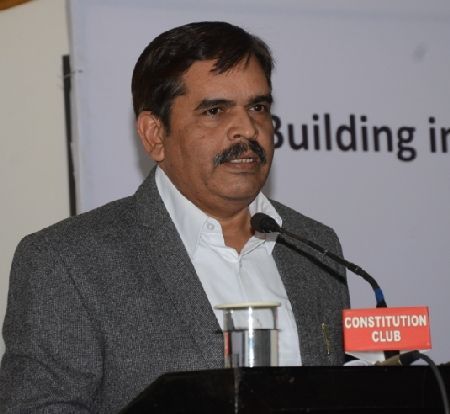
'We are allowing FDI on the terms of the investors, multinationals.'
'We bow down to whatever they say.'
'When they say you open this sector, we open that sector.'
Dr Ashwani Mahajan, co-convenor of the Swadeshi Jagran Manch and an associate professor at Delhi University, is totally opposed to the National Democratic Alliance's government's Foreign Direct Investment policy.
The SJM protested in all district headquarters on August 9, the day Indians stood up against the British and Mahatma Gandhi launched the Quit India movement.
Dr Mahajan, below, left, spoke exclusively to Rediff.com's Shobha Warrier from Delhi on why the SJM is against the FDI policy in its present form.
FDI played a major role in China's growth story. Today, India is a favoured destination for foreigners, attracting around $63 billion (about Rs 422,100 crore) as FDI, ahead of China.
You have expressed 'deep anguish' over India's FDI policy. Why?
This example of China is misplaced because China allowed FDI on its own terms, that too long time back. We are allowing FDI on the terms of the investors, multinationals, etc.
We bow down to whatever they say. When they say you open this sector, we open that sector.
If you send them income tax notices, they blackmail you by saying they will bring the market down.
Recently the income tax department sent notices to companies where Rs 30,000 crore (Rs 300 billion) was due from an MNC, but no action was taken because they didn't want to spoil the investment climate of the country.
Yes, we are getting FDI, but we are getting it on their terms, and not the way it is required for the country.
You mean you are not against FDI per se, but you are against the way it is done?
No. This is the theoretical aspect of it and practically, in the last 14, 15 years, we got FDI of around $345 billion (about Rs 23 lakh crore<). And the amount of foreign exchange that went from the country during the same period was around $287 billion (about Rs 19 lakh crore)!
This is only one part of the story.
Shekhar Swamy, the CEO of R K Swamy, did a study of 28 MNCs and found out that these MNCs with a share capital of Rs 1,954 crore (Rs 19.54 billion), brought in Rs 10,696 crore (Rs 106.96 billion) worth of foreign exchange, but transferred Rs 26,334 crore (Rs 263.34 billion) worth of foreign exchange, which he calls FDO (Foreign Direct Outflow).
Therefore, he said that it is not how much FDI has been brought in by MNCs that is more important, but how much FDO happened.
We are getting FDI only by opening new and new sectors. After a point, it will stop coming because you don't have any more sectors to open, but the outflow of money will continue.
In 2014-2015, we got an FDI of $31 billion (about Rs 207,700 crore) but the outflow due to income transfer due to royalty, income, etc was $36.5 billion (about Rs 244,550 crore).
The nation is losing money on this account. Also, we are losing money because the import by these companies is too high.
Then, thousands of cases are pending in the courts in the income tax department on transfer pricing, which is evading tax by over invoicing imports and under invoicing exports.
MNCs have branches all over the world and they send out profits without paying any tax. It is not that the government is not aware of this; they are very well aware of this.
The mindset of all regimes is such that the development of the country is possible only with the help of FDI.
That's why we have been telling all governments to come out with a white paper if they really believe that it will help the country and improve the condition of the people. Why are they shying away from it?
When the Congress was in power, they said FDI was such a good thing for the country and that the BJP was opposing it. Now that the BJP is in power, I heard former Union minister Jairam Ramesh saying exactly the opposite. In fact, he was saying the same argument the SJM is giving.
If somebody is pumping in money into the country, although it is to make money, if it helps the country's economy and provides more jobs, is there anything wrong in it?
The fact is FDI drains India's resources and does not supplement them.
Whenever foreign investment comes, it has to go to the Reserve Bank of India and what does the RBI do? It prints more currency notes and gives them to you.
The only purpose FDI is serving is filling the gap of imports and exports. The gap is there because various governments have not taken enough steps to make imports and exports balanced.
And we have been constantly saying that by adopting this free import policy, it has created an imbalance in imports and exports.
Why is it that all the governments, all over the world, are obsessed with FDI?
The argument for FDI is not that of various governments; it is by the World Bank, the International Monetary Fund, the US treasury department, the European Union and those who have vested interests.
You just go back to 1989-1990, and read what the Washington Consensus (external link) is.
FDI is not for supplementing resources, it is only about helping the MNCs. Then the governments believe that if the import-export gap is not filled by FDI, the rupee will be devalued.
What the government should do is not to go after FDI, but restrict imports. China did not have this problem because they were exporting to the entire world.
Remember in his last budget, P Chidambaram said, FDI and Foreign Institutional Investors are not a matter of choice; it is a compulsion. This government is also living with the same compulsion.
What we are saying is, stop thinking about FDI and restrict the imports of third grade Chinese goods. We have a trade gap of $45 billion (about Rs 301,500 crore) with China.
 What exactly is the compulsion of various governments?
What exactly is the compulsion of various governments?
Instead of taking a difficult route, they think that let the FDI come and bridge the gap between imports and exports. But import of goods is killing our small scale industry and also our economy.
We have to come out of this vicious circle.
You said it would be the deathknell for shopkeepers and vegetable vendors if FDI enters food processing and agriculture. We have been hearing for two decades about setting up food processing units in the villages but even today, 25 to 30 per cent of our fruits and vegetables go waste.
These figures are not at all dependable and these are all lies put forward by the MNCs. Just because the government agencies are saying this, it need not be the official figures.
The truth is no official study has been done on food products. Per capita wastage of food products in the USA is 290 kg, it is 280 kg in Europe and in Asian countries, it is 125 kg.
The wastage is mainly because the MNCs go to the farms and select only the best produce and reject a big portion of the produce. Then the shelf life of many of them is also fixed. The United Nations says that food wastage is more in developed countries than in developing countries.
If you go to a vegetable market in India at night, you see that they give away the remaining vegetables almost free and they are bought by the poor.
I would say each gram of vegetable is used in India. So what they call unorganised is the most organised retailing.
And if you are going to have food processing units, they have to be in each village unit. The government should encourage this and this is what we told the finance minister too.
If you open this sector to FDI, foreign companies will come and take over everything. This will affect the small farmers as they do not offer good price to them.
We have seen that in Punjab. Even in the US, farmers are not getting even 25 per cent of the total share.
In the case of the pharma sector also, do you think with FDI, the prices of medicines would go up?
That's the most dangerous thing that is going to happen. You go to any government cancer hospital and see the condition of the patients.
Also, we are giving medicines to 200 countries and the poor people of those countries depend on that. Even America depends on medicines supplied from India.
When Barack Obama came, he had negotiations with Indian companies to supply phrama products. If we give the pharma sector to the MNCs, 99 per cent of people in India will not be able to afford medicines.
The question that we ask is, don't you understand what brown field pharma is? Are you going to allow MNCs to take over Indian companies just for a few dollars?
This way, they are going to hurt the supply of cheap medicines for poor people. They should realise that pharma is a handle with care sector.
Why do you say that FDI in defence is dangerous? The government talks about the need to have advanced technology to make products in India.
We are not against FDI in defence per se. If new technology transfer takes place, and we are able to make products here instead of importing, our imports will come down, which is one of our objectives.
But what they are allowing is doing away with the state of the art technology. The US companies are not allowed to transfer technology even if they are investing outside the country.
If they cannot transfer technology, you will again be dependent on their mercy.
We need to allow FDI in defence, but there should be a transfer of technology. We are happy that the government is allowing the private sector here but they have to be cautious about FDI.
You are for FDI in defence, but you are against FDI in retail, agriculture, etc.
That is because we don't need any technology in retail or agriculture, but we need modern technology in defence.
We, at SJM feel that the FDI policy is a new kind of imperialism. We will not allow this to happen, and that's why we are going to give a memorandum to the prime minister and state ministers all over the country.
We are expressing our protest and anguish on the policy of the government.
ALSO READ











 © 2025
© 2025